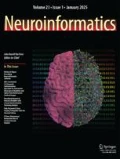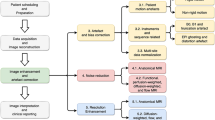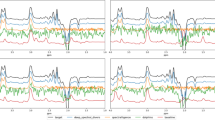Abstract
The most recent history of parallel Magnetic Resonance Imaging (pMRI) has in large part been devoted to finding ways to reduce acquisition time. While joint total variation (JTV) regularized model has been demonstrated as a powerful tool in increasing sampling speed for pMRI, however, the major bottleneck is the inefficiency of the optimization method. While all present state-of-the-art optimizations for the JTV model could only reach a sublinear convergence rate, in this paper, we squeeze the performance by proposing a linear-convergent optimization method for the JTV model. The proposed method is based on the Iterative Reweighted Least Squares algorithm. Due to the complexity of the tangled JTV objective, we design a novel preconditioner to further accelerate the proposed method. Extensive experiments demonstrate the superior performance of the proposed algorithm for pMRI regarding both accuracy and efficiency compared with state-of-the-art methods.


Similar content being viewed by others
References
Acton, F.S. (1990). Numerical methods that work. Maa.
Beck, A., & Teboulle, M. (2009). Fast gradient-based algorithms for constrained total variation image denoising and deblurring problems. IEEE Trans. Image Process, 18(11), 2419–2434.
Beck, A., & Teboulle, M. (2009). A fast iterative shrinkage-thresholding algorithm for linear inverse problems. SIAM Journal. on Imag. Sci., 2(1), 183–202.
Chen, C., Huang, J., He, L., Li, H. (2014). Preconditioning for accelerated iteratively reweighted least squares in structured sparsity reconstruction. In CVPR 2014 pp. (2713–2720). IEEE.
Chen, C., Li, Y., Huang, J. (2013). Calibrationless parallel MRI with joint total variation regularization. In Mori, K., Sakuma, I., Sato, Y., Barillot, C., Navab, N. (Eds.) MICCAI 2013, Part III. LNCS (vol. 8151, pp. 106–114). Springer, Heidelberg.
Daubechies, I., DeVore, R., Fornasier, M., Sinan Güntürk, C. (2010). Iteratively reweighted least squares minimization for sparse recovery. Comm. on Pure and Applied Math., 63(1), 1–38.
Donoho, D.L. (2006). Compressed sensing. IEEE Trans. Inf. Theory, 52(4), 1289–1306.
Griswold, M.A., Jakob, P.M., Heidemann, R.M., Nittka, M., Jellus, V., Wang, J., Kiefer, B., Haase, A. (2002). Generalized autocalibrating partially parallel acquisitions (GRAPPA). Magn. Reson. Med., 47 (6), 1202–1210.
Huang, J., Chen, C., Axel, L. (2012). Fast multi-contrast MRI reconstruction. In Proc. Int. Conf. MICCAI.
Huang, J., Zhang, T., Metaxas, M.D. (2011). Learning with structured sparsity. J. Learn. Res., 12, 3371–3412.
Jakob, P.M., Grisowld, M.A., Edelman, R.R., Sodickson, D.K. (1998). Auto-smash: a self-calibrating technique for smash imaging. Magnetic Resonance Materials in Physics Biology and Medicine, 7(1), 42–54.
Liang, D., Bo, L., Wang, J.J., Ying, L. (2009). Accelerating SENSE using compressed sensing. Magn. Reson. Med., 62(6), 1574– 1584.
Lustig, M., Donoho, D., Pauly, J.M. (2007). Sparse MRI: The application of compressed sensing for rapid MR imaging. Magn. Reson. Med., 58(6), 1182–1195.
Lustig, M., & Pauly, J.M. (2010). SPIRiT: Iterative self-consistent parallel imaging reconstruction from arbitrary k-space. Magn. Reson. Med., 64(2), 457–471.
Majumdar, A., & Ward, R.K. (2012). Calibration-less multi-coil mr image reconstruction. Magn. Reson. Imag., 30(7), 1032–1045.
Pruessmann, K.P., Weiger, M., Scheidegger, M.B., Boesiger, P., et al. (1999). SENSE: sensitivity encoding for fast MRI. Magn. Reson. Med., 42(5), 952–962.
Saad, Y. (2003). Iterative methods for sparse linear systems. Siam.
Sawyer, A.M., Lustig, M., Alley, M., Uecker, P., Virtue, P., Lai, P., Vasanawala, S., Healthcare, G. (2013). Creation of fully sampled MR data repository for compressed sensing of the knee.
Shewchuk, J.R. (1994). An introduction to the conjugate gradient method without the agonizing pain.
Shin, P.J., Larson, P.E.Z., Ohliger, M.A., Elad, M., Pauly, J.M., Vigneron, D.B., Lustig, M. (2014). Calibrationless parallel imaging reconstruction based on structured low-rank matrix completion. Magn. Reson. Med., 72(4), 959–970.
Sodickson, D.K., & Manning, W.J. (1997). Simultaneous acquisition of spatial harmonics (smash): fast imaging with radiofrequency coil arrays. Magnetic Resonance in Medicine, 38(4), 591–603.
Varga, R.S. (2009). Matrix iterative analysis Vol. 27. Berlin: Springer Science & Business Media.
Xu, Z., Li, Y., Axel, L., Huang, J. (2015). Efficient preconditioning in joint total variation regularized parallel MRI reconstruction. MICCAI 2015 Part III, LNCS.
Young, D. (1954). Iterative methods for solving partial difference equations of elliptic type. Transactions of the American Mathematical Society, 76(1), 92–111.
Author information
Authors and Affiliations
Corresponding author
Rights and permissions
About this article
Cite this article
Xu, Z., Wang, S., Li, Y. et al. PRIM: An Efficient Preconditioning Iterative Reweighted Least Squares Method for Parallel Brain MRI Reconstruction. Neuroinform 16, 425–430 (2018). https://doi.org/10.1007/s12021-017-9354-9
Published:
Issue Date:
DOI: https://doi.org/10.1007/s12021-017-9354-9




